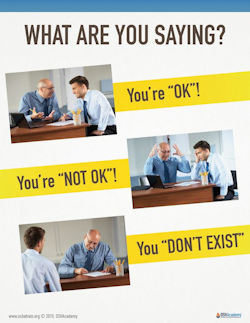I'm Okay - You're Okay
So how does all this about communication fit into workplace safety and health?
Let's look at three situations and the messages sent:
- You're OK: When the supervisor recognizes an employee for safe work behaviors, it reinforces and makes that behavior more likely to occur in the future. It sends a very positive message, doesn't it?
- You're not OK: On the other hand, if a supervisor yells at an employee for complaining, a very negative message is sent. The complaining may continue, but probably not in front of the supervisor.
- You don't exist: The worst situation occurs when an employee is totally ignored by a supervisor. It sends a message that the employee is invisible, unimportant, and of little or no value. After a time, the result is a very unmotivated employee.
As we mentioned earlier in the course, ignoring others who are trying to communicate is the worst response possible. People won't care why they are being ignored: They just don't like it. They'll make all kind of assumptions about why they're being ignored, and be upset about it.
If you want to have better working relationships with others, always be the first to say "hi" when you meet them for the day. It sends a very positive message. It tells them you consider them to be important. I guarantee the result will be better working relationships!
Knowledge Check Choose the best answer for the question.
4-5. Jack's supervisor walked up to him and recognized him for wearing fall protection. What will Jack's behavior likely be in the future?
You forgot to answer the question!

